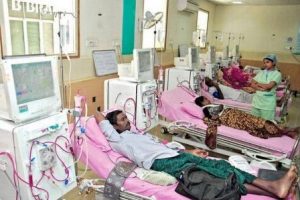Need for Immediate Action on Chronic Kidney Disease
Chronic Kidney Disease is a grossly understated public health problem, which will require focused plans of action by governments across the nations to combat the rising epidemic.

Chronic diseases are increasingly becoming a major factor in rising mortality and morbidity globally. One such illness is the Chronic Kidney Disease (CKD) which affects the functioning of the kidneys and leads to premature death, in most cases. The number of deaths caused by CKD has increased by 82.3 per cent in the last two decades, and this also makes it one of the most prominent causes of deaths, only behind diabetes and AIDS.
According to the National Kidney Foundation, 37 million adults in the United States of America (USA) suffer from CKD and many more are at-risk. Another study found that in 2015 alone, more than a million people had succumbed to kidney failure worldwide. In light of these findings, experts conclude that CKD is amongst the top five causes of human deaths, every year.
Prevalence of CKD in India
Approximately 30 per cent of patients of diabetes mellitus suffer from diabetic nephropathy—a type of kidney damage resulting from diabetes. Due to the growing numbers of diabetic patients in India, the likelihood of CKD has also increased. As per a report, the number of Indians affected by diabetes is expected to increase to about 70 million by 2025. Another study, published recently in a journal from a rural belt of Karnataka, showed 3.82 per cent prevalence of diabetes and 33.62 percent of hypertension—both prominent causes of CKD. Researchers also found a 6.3 per cent prevalence ofstage-3 CKD in the population. The major hotspots of kidney diseases in India are Andhra Pradesh, central Odisha, Puducherry and Maharashtra. Despite its magnitude and epidemiological threat, the underlying causes of CKD are not yet fully understood. Further, there is a discernible dearth of data on the prevalence of CKD in the larger Indian population; the role of which cannot be overstated.
Also Read : For Achieving Universal Care For Kidney Diseases
Data collection is important not only to understand healthcare dynamics at large but to design effective and appropriate solutions to address the issue.
The absence of proper information creates a void in public health policy and results in causing damage to the personal lives of people as well as to the economic state of the nation. In 2005, some initial work to rectify this information gap was undertaken by a voluntary reporting organization called the Indian CKD Registry, which collects and stores self-reported data about CKD patients. The database has about 63,538 patients enrolled, of which 70 per cent are males; and nearly 74 per cent suffer with stage-4 and stage-5 CKD. But the registry is still limited as data is sourced only from hospitals where CKD patients receive treatment. An accurate estimate of those without treatment or lacking awareness about their condition is still beyond our grasps.
Global Action on CKD

Similarly, the availability of data on the global prevalence of kidney diseases varies significantly because of insufficient data and lack of proper monitoring. Incorporating kidney disease surveillance parameters in existing chronic disease prevention programme might enhance global efforts towards obtaining high-quality information on the burden of kidney disease and its consequences. What’s worse is that the global importance of kidney diseases is not fully acknowledged as evident in the complete omission of kidney diseases from the WHO’s Global Action Plan (GAP)—an annually released ‘strategy document’ for global health agencies on how they can work together and help countries advance their health preferences across the 17 Sustainable Development Goals (SDGs) of 2030. Notwithstanding the fact that only SDG-3 is focused on ‘health outcomes’, we need a concerted action plan to tackle chronic illnesses like CKD, to fulfil the promise and expectation of ‘healthy lives and well-being for all’.
What Can Be Done in India?
A mere 1 per cent of the GDP is allocated to the public health expenditure in our country. Given the propensity of those living in developing nations to illnesses as well as the large magnitude of our population, this figure seems absurdly inadequate. Further, state-sponsored healthcare services are provided only at primary healthcare centres, whereas the treatment and prevention of kidney diseases are available only at higher-level, often private hospitals. A vast majority of Indians do not have access to health insurance and are forced to choose between funding expensive treatment or suffering from debilitating life-threatening symptoms.
Also Read : Cannabis The Future Of Autoimmune Disorders
Given this backdrop, the Pradhan Mantri National Dialysis Programme which provides people with dialysis at affordable prices is a welcome move. At the moment, under the National Health Mission, 100 per cent of the service procedure fees of the patients from below the poverty line (BPL) is covered. Even Non-BPL patients can avail these services at district hospitals at the same price as paid by BPL patients. Though due to the originally high price of the treatment and mandated repeated sessions, the total cost cannot be adequately covered. As I write this, discussions to offer maximal coverage to people registered under the RSBY (Rashtriya Swasthya Bima Yojana) are underway and aims to provide much-needed respite to those suffering from chronic illnesses.
On the global level, efforts aimed at addressing non-communicable diseases (NCDs) such as CKD require policies and action in sectors other than public health.
Developing public policies in sectors like agriculture, urban development, education, food and pharmaceuticals would certainly help to create better health conditions and environment. For instance, the government must exact stricter taxation policies on items that are injurious to health such as alcohol, tobacco as well as the consumption of junk-food items. However, as stated by the United Nations Secretary-General, António Guterres, on December 2017, during a meeting on the Control and Prevention of Non-Communicable Diseases, ‘political commitments have not translated into concrete action’, proves that policy-making in itself is insufficient and unsatisfactory. As is discussed here, the prevention of CKD and other life-threatening chronic illnesses require more serious deliberation and action. At present, our collective lack of intent to address these conditions is concerning. One can only hope for better policies and guidelines, both at the global and national level, in the future, so that we are able to meet our promise of providing ‘healthcare and well-being for all’ by 2030.
